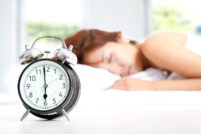The temperature of your bedroom has more influence on your sleep than you may think!
Changes in temperature are part of the key signals our body sends to let our brains know it’s time to hit the hay — and your warm, cozy bedroom might be the cause of significant disruptions in this line of communication.
Figure out what’s your ideal temperature for sleep, and incorporate these tips and tricks into your bedtime routine for a deeper, more satisfying sleep experience.
How Does Temperature Affect Your Sleep And Circadian Rhythms?
Circadian rhythms are routine behavioral, mental and physical changes that takes place throughout the day under the direction of our internal “body clock.”
These include changes in appetite, alertness, heart rate, and — of particular interest to us — body temperature.
The natural fluctuations in body temperature which occur over the course of a day are integral to the regulation of your sleep-wake cycle.
In the evening, your body temperature begins to drop — reaching its lowest level at around 5:00am the following morning — after which it slowly climbs back up. [1]
In fact, even the simple action of lying down can make you feel sleepy because it redistributes your body heat from your core to your extremities. [2]
Thus, while we sleep our body is naturally intended to be cooler than during our daytime activities. So, while fleece blankets and down comforters are an extremely inviting retreat at the end of a long day, they may be increasing your temperature and disrupting your sleep.
How Your Body Temperature Might Cause Insomnia
Certain types of insomnia have been linked to a disorder in body-temperature. These individuals do not experience the typical drop in temperature just before bed, resulting in increased arousal and making it harder to fall asleep. [3]
This form of insomnia can be treated with the use of a cooling cap — which works exactly as it sounds like: counteracting the raised temperature by cooling down the scalp, and reducing the unwelcome brain activity. [4]
The Optimal Temperature For Sleep
As a general rule, the optimal temperature for sleep is somewhere between 60-68° F; [5] As to where precisely along this range you should set your bedroom thermostat actually varies from person to person.
When trying to figure out what your ideal thermostat setting is, start somewhere mid-range and then increase or decrease the temperature the following night.
Experimentation is key: You won’t know what works best unless you try out a variety of options.
How to Improve Newborn and Infant Sleep
New parents are often instructed to bundle up their babies, as the heat will help they fall asleep faster: And it does.
However, when it comes to keeping your baby asleep they’re just like you and I and require a cooler room temperature around 65-70 F (18-21 C).
Overheating is associated with a higher incidence of Sudden Infant Death Syndrome (SIDS). For this reason, the National Institute of Health recommends that parents dress their babies in light clothing and keep the nursery at the recommended temperature. [6]
If your baby is waking up frequently during the night, check their temperature by feeling their belly or the back of their neck.
Nowadays, many baby monitors include a thermostat feature; but, if yours comes without you can easily place a thermometer in their room to track the temperature. [7]
8 Tips Beyond Lowering The Thermostat: Other Ways To Cool Down While You Sleep
1. Adjust your bedding for the season
If you’re using the same bedding throughout all four seasons then you’re likely to encounter issues in overheating during warmer months.
2. Use cotton sheets
Cotton is both light and breathable: meaning that it does not trap heat in like its synthetic counterparts. Even in cooler months it’s recommended to opt for natural fibers to prevent overheating.
3. Swap your pillows
Once again, synthetic filled pillows are prone to overheating. Likewise, while memory foam is the epitome of comfort it’s known to trap heat.
4. Evaluate your sleep attire
If sleeping in the buff isn’t your cup of tea, make sure you’re choosing natural fibers to prevent overheating. You can also purchase moisture-wicking pajamas, which can go a long way to reducing uncomfortable night sweats.
5. Eat smaller meals in evening
Digesting a large meal causes an increase in body temperature which can cancel out your body’s attempts to lower it to prepare for bedtime.
6. Warm up with a bath or shower
Heating up with a hot bath or shower an hour-or-so before your bedtime can help you fall asleep faster. As your body cools down it mimics the natural decrease in temperature associated with sleepiness.
7. Drink cool water
Follow up your shower by drinking some cool water to contribute to the drop in body temperature. You can also keep a glass next to your bed to sip if you wake up uncomfortably warm.
8. Change your sleep position
While you may feel coziest curled up in a tight ball on your side, it’s not doing you any favors as far as body temperature. Try stretching out to allow your body heat to redistribute properly, and avoid skin-to-skin contact. Or try a completely different sleeping position.
Colder Is Not Always Better
While the majority of us could benefit from a decrease in temperature at night, it’s important to keep in mind that colder is not always better.
By altering your bedroom’s temperature you’re trying to help your body reach its predetermined optimal sleep temperature.
If your room is either too hot or too cold it will make this process more difficult, and negatively impact your sleep. [8]
You should always feel comfortable: Shivering is no better for sleep than sweating.
If you find that just your hands and feet are getting chilly, try wearing socks or bringing a hot water bottle to bed to keep these areas cozy.
Sweet Dreams
Helping your body reach its ideal temperature at night will enable you to fall asleep faster, sleep more deeply, and limit nighttime awakenings.
Additionally, sleeping at your optimal temperature improves the quality of REM sleep — the stage in which dreaming happens.
Dreaming has a positive impact on our psychological and emotional well-being, and aids in memory consolidation. [9]





